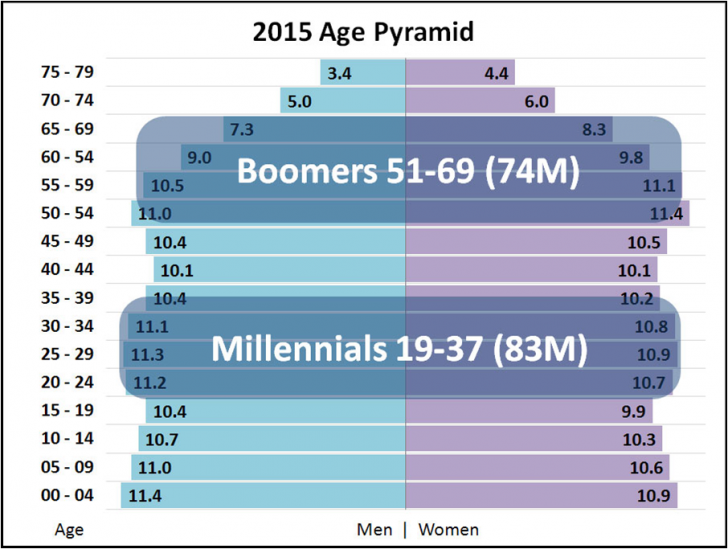Job Corner: How to Get Along With Younger Co-Workers
Monday, March 09, 2015

Plus, she said, “I just don’t have anything in common with them.”
Now I know there’s some gross generalization going on there. I’ve worked with numerous millennial clients and colleagues that capably hold a conversation with a much older adult. But maybe you – as the much older adult - also struggle with this concept at work.
22, 23 and 21 year olds are now the three largest age populations in the U.S., with 50 million boomers still in the workforce – and many delaying the prospect of retirement - we’ve got to figure out how to work together.

The conversation with my client was a good reminder that any time we work with people who are remarkably different that we are, we are challenged to put aside assumptions, open our minds and make a conscious decision to build supportive relationships in spite of our differences.
If you struggle with younger colleagues, think of this as an opportunity to stretch your leadership muscles. Take the lead to welcome and engage younger workers cordially and professionally. Find ways to build relationships and explore common ground rather than focusing on your differences.
1. Put yourself in their shoes.
Imagine how hard it can be for young person to immerse into a predominantly older workforce, and how conspicuously different they may feel. Ask them what you can do to make their experience less daunting.
2. Don't make assumptions about them being bratty, entitled young adults you've read about.
Frankly I haven't met many that live up to the hype with which their generation has been smeared. You don't know their story, what they've overcome to be where they are or how nervous they may feel at this stage in their careers.

Remember all the people who helped you in your career? Pay it forward. Ask what you can do to help them get started. Offer support as they are acclimated to the workplace. What do they need to know about the work, the organization, the industry, or the people, that you can help with?
4. Explore their ideas.
Instead of shooting down new ideas, engage them in dialogue. They have new eyes and will see things differently. Sure, not everything they offer will make sense for the organization right now. So inquire about their point of view, have a conversation. Be open to what their perspective offers. You might create something together.
5. Invite them in.
If you have workplace traditions or celebrations, personally invite them to participate, even if you send a group email. It's a way to reach out and include them; to create community together.
6. Treat them like adults.
Avoid addressing them using terms like son, dear, champ, missy, or other diminutive appellations. This is a workplace, after all, not your kid's little league team.
7. Avoid sentences that begin with, "When I was your age...."
This is a tough one, because you may think the only thing you have in common with a younger person is that at some point you were the same age that they are now.
Instead of regaling them with tales of your (possibly misspent) youth, ask about their interests, inquire about how they see their future unfolding, why they studied what they did, and why they wanted to work for your organization.
What do they aspire to? Ask what keeps them up at night. You might find some common ground that will surprise you.
8. Don't be a Negative Nelly, even if you think everything and everyone in the organization sucks.
Young energy and optimism can be contagious. Don't squash it. Try to catch it.
9. Don't treat them like children.
Don’t compare them to your children or in any way refer to them as being like or behaving like, your children. They are not your children (or grandchildren.)
They are professionals, just like you, and the others that you work with. They just have a different level of experience and a different life experience.
10. Don't ask them how old they are.
It's none of your business, and, it's immaterial to getting work done.
11. Don't comment on how young they look. See above.
12. Don't resent them because of their age.
If you feel resentful, examine your motives and see what's bothering you. It has nothing to do with them, I assure you.
13. Save the unsolicited advice.
This may come as a shock, but if they didn't ask you for your advice, they're probably not listening anyway. (That’s a free tip for you; I had to pay a therapist for it. )
And yeah, sure, talk about your cats, your kids, or crochet if you must. Rail against how much times are changing. You could do all that. Or, you could raise the bar, and change the experience you are both having. I know you can do it.

She also works with individuals and teams to make the work experience better, resolve conflict, and address things like generational differences. Get started with her 21 Days To Peace At Work e-course. It’s free!
Related Articles
- Job Corner: 4 Bad Habits Making Your Job Search Miserable
- Job Corner: 6 Strategies For Your Bully Boss
- Job Corner: Are You A LinkedIn Loser?
- Job Corner: Don’t Write a Crappy LinkedIn Headline
- Job Corner: Resume Templates Are Killing Your Job Search
- Job Corner: Why Your Boss is a Bully




Follow us on Pinterest Google + Facebook Twitter See It Read It